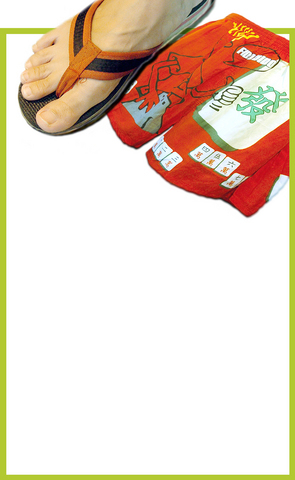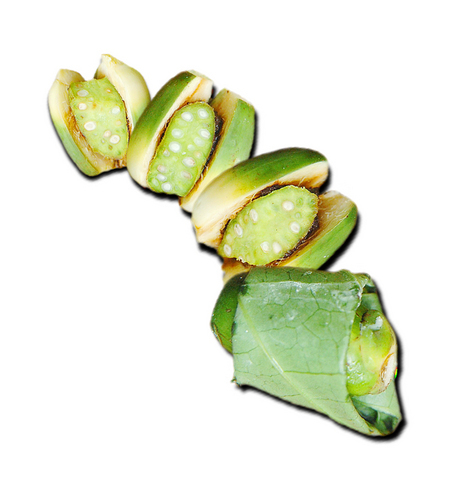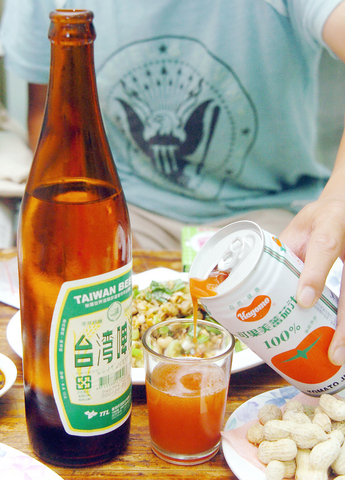A woman walks into a 7-Eleven wearing plastic slippers, jeans under a short skirt, an "Abibas" shirt and her motorcycle helmet. She purchases a bottle of rice wine, several cans of Vitali, and a pack of Long Life cigarettes, gets on the back of a scooter already occupied by three family members and rides away.
Though this scenario is an imagined one, it's no stretch of the imagination. It is a stereotypical look at the habits of a few Taiwanese people's habits and behavior. This was sometimes encapsulated by the term taike (
But while the slight hasn't completely lost its sting, it has been soothed by the surging popularity of Taiwanese culture. "Taike" has entered the lexicon of cool.

PHOTOS: CHANG CHIA-MING, TAIPEI TIMES
In their current issue, the editors of Eslite Reader (
It claims taike as a term is not anti-Taiwanese, but instead can be embraced as an integral part of local culture and another aspect of bentuhua (
"Some people have told us that if we talk about it, we're still making fun of it," said Sophie Chiang (

It wasn't always thus. When the KMT supporters first arrived in the country they were often ostracized by locals who felt oppressed by the government that had taken charge of the island. The KMT supporters, many of them soldiers, were seen by Taiwanese as tang shan zi (
To the new arrivals, locals became taike, literally "Taiwanese guests." This was the sociopolitical pressure cooker that would simmer and occasionally come to boil over the next decades, alleviated by the end of martial law nearly 20 years ago and democratization.
To what degree time has tempered those ill feelings depends on who you ask, but it has certainly altered the semantics of the situation. For today's generation of young people in particular taike is more likely to be used playfully, rather than used as an insult.

It has even been co-opted by some who embrace the stereotypes. Wu Peng-feng (
"It depends on who's talking and how they say it," he said. "If it's a young person, they probably don't mean it as an insult. But if it's an older person, it could be impolite. It depends on their tone."
Like others interviewed for this article, Wu shied away from offering a description of the term, saying instead that one simply knows it when one sees it.
Examples that were offered by others included: The cup wedged between the seats of a cab for the driver to spit betel nut; watermelon dipped in soy sauce and wasabi; the ubiquitous sausage-seller; hometown rock hero Wu Bai's (
Chiang said their decision to write about "new taike", as they call it, was based in part on the many Web sites that discuss the stereotypes.
"Some [of the Web sites] say it's discriminatory and other say it's still a little bit insulting," she said. "But at the same time there are celebrities who imitate taike." Rather than making fun, she said, they're emulating attributes they find cool.
Advertising, too, has targeted the stereotypes to sell everything from energy drinks to banking services.
"Taike is being released from its stereotypes and becoming a lifestyle term," Chiang said. "To embrace it, you maybe accept a more liberal lifestyle or you are bolder or braver. ... It's about the power of naming and identity," she said, and the fact that we control what words mean.
Still, there are places where plastic slippers aren't seen as a fashion statement. Signs outside nightclubs often proscribe chewing betel nut or blowing whistles and warn that anyone wearing slippers will be refused entry.
Chiang prefers to see the current debate in a broader context. Despite Taiwan's 400 years of history, she said, colonization and political upheaval have made for interesting times.
"Everything has happened here very quickly," she said. "The essence of being Taiwanese is change. Taike, too, is changing in context."
△ Look for the Taike Rock and Roll Concert (台客搖滾演唱會) to take place on Aug. 19 and Aug. 20 at the Taipei International Convention Center, with headliners Wu Bai and China Blue, MC Hotdog, Zhang Zhen-yue (
△ For more information on tickets and what it means to be taike, visit http://www.bcc.com.tw/all_net/news/tsong/tsong.htm.

On April 26, The Lancet published a letter from two doctors at Taichung-based China Medical University Hospital (CMUH) warning that “Taiwan’s Health Care System is on the Brink of Collapse.” The authors said that “Years of policy inaction and mismanagement of resources have led to the National Health Insurance system operating under unsustainable conditions.” The pushback was immediate. Errors in the paper were quickly identified and publicized, to discredit the authors (the hospital apologized). CNA reported that CMUH said the letter described Taiwan in 2021 as having 62 nurses per 10,000 people, when the correct number was 78 nurses per 10,000

As we live longer, our risk of cognitive impairment is increasing. How can we delay the onset of symptoms? Do we have to give up every indulgence or can small changes make a difference? We asked neurologists for tips on how to keep our brains healthy for life. TAKE CARE OF YOUR HEALTH “All of the sensible things that apply to bodily health apply to brain health,” says Suzanne O’Sullivan, a consultant in neurology at the National Hospital for Neurology and Neurosurgery in London, and the author of The Age of Diagnosis. “When you’re 20, you can get away with absolute

May 5 to May 11 What started out as friction between Taiwanese students at Taichung First High School and a Japanese head cook escalated dramatically over the first two weeks of May 1927. It began on April 30 when the cook’s wife knew that lotus starch used in that night’s dinner had rat feces in it, but failed to inform staff until the meal was already prepared. The students believed that her silence was intentional, and filed a complaint. The school’s Japanese administrators sided with the cook’s family, dismissing the students as troublemakers and clamping down on their freedoms — with

As Donald Trump’s executive order in March led to the shuttering of Voice of America (VOA) — the global broadcaster whose roots date back to the fight against Nazi propaganda — he quickly attracted support from figures not used to aligning themselves with any US administration. Trump had ordered the US Agency for Global Media, the federal agency that funds VOA and other groups promoting independent journalism overseas, to be “eliminated to the maximum extent consistent with applicable law.” The decision suddenly halted programming in 49 languages to more than 425 million people. In Moscow, Margarita Simonyan, the hardline editor-in-chief of the